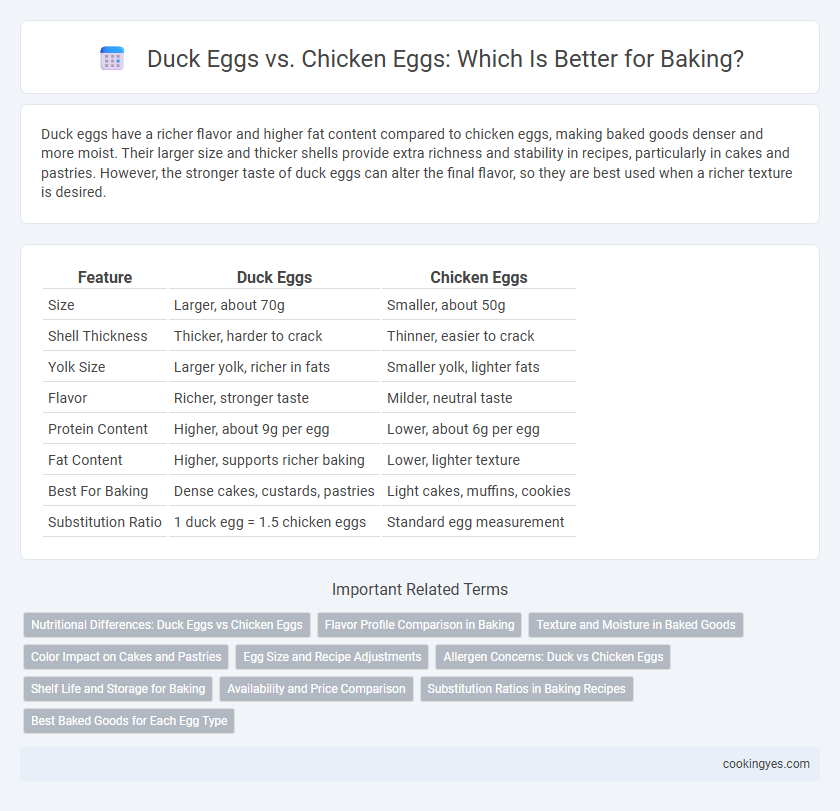Duck eggs have a richer flavor and higher fat content compared to chicken eggs, making baked goods denser and more moist. Their larger size and thicker shells provide extra richness and stability in recipes, particularly in cakes and pastries. However, the stronger taste of duck eggs can alter the final flavor, so they are best used when a richer texture is desired.
Table of Comparison
| Feature | Duck Eggs | Chicken Eggs |
|---|---|---|
| Size | Larger, about 70g | Smaller, about 50g |
| Shell Thickness | Thicker, harder to crack | Thinner, easier to crack |
| Yolk Size | Larger yolk, richer in fats | Smaller yolk, lighter fats |
| Flavor | Richer, stronger taste | Milder, neutral taste |
| Protein Content | Higher, about 9g per egg | Lower, about 6g per egg |
| Fat Content | Higher, supports richer baking | Lower, lighter texture |
| Best For Baking | Dense cakes, custards, pastries | Light cakes, muffins, cookies |
| Substitution Ratio | 1 duck egg = 1.5 chicken eggs | Standard egg measurement |
Nutritional Differences: Duck Eggs vs Chicken Eggs
Duck eggs contain higher amounts of protein, fat, and omega-3 fatty acids compared to chicken eggs, making them richer and more nutrient-dense for baking purposes. The larger yolk size in duck eggs contributes to a creamier texture and enhanced moisture content in baked goods. Chicken eggs, while lower in fat and calories, provide a milder flavor and lighter texture, often preferred for delicate pastries and cakes.
Flavor Profile Comparison in Baking
Duck eggs have a richer, creamier flavor compared to chicken eggs, adding depth and complexity to baked goods. Their higher fat content enhances moisture and tenderness in cakes and pastries, creating a more luxurious texture. Chicken eggs offer a milder taste, making them ideal for recipes where a subtle, neutral flavor is preferred.
Texture and Moisture in Baked Goods
Duck eggs contain higher fat and protein levels than chicken eggs, resulting in richer texture and enhanced moisture retention in baked goods. Their larger yolks contribute to a creamier consistency and tender crumb, making them ideal for cakes and pastries. Substituting duck eggs in recipes often produces softer, more moist baked products with a slightly denser bite compared to chicken eggs.
Color Impact on Cakes and Pastries
Duck eggs contain higher fat and protein content compared to chicken eggs, which contributes to richer, moister cakes and pastries with a denser texture. The yolk of duck eggs tends to be deeper orange, lending a more vibrant color to baked goods, enhancing visual appeal. In contrast, chicken eggs usually produce lighter-colored cakes, making duck eggs a preferred choice for bakers aiming for both intensified flavor and striking color in their creations.
Egg Size and Recipe Adjustments
Duck eggs are larger than chicken eggs, typically weighing about 70 grams compared to 50 grams, which can impact baking recipes that rely on precise egg proportions. When substituting duck eggs for chicken eggs, reduce the number of eggs slightly or adjust other wet ingredients to maintain the proper batter consistency. Their higher fat content and larger size contribute to richer baked goods, but careful measurement ensures balanced texture and flavor.
Allergen Concerns: Duck vs Chicken Eggs
Duck eggs contain higher levels of protein and allergens compared to chicken eggs, which may increase the risk of allergic reactions in sensitive individuals. Studies indicate that people allergic to chicken eggs might also react to duck eggs due to cross-reactivity, but some may tolerate one type better than the other. When baking, it is crucial to consider these allergen differences and communicate the egg type used to avoid potential allergic responses.
Shelf Life and Storage for Baking
Duck eggs have a longer shelf life than chicken eggs, typically lasting up to 5 weeks when properly refrigerated at 40degF (4degC), compared to chicken eggs which last about 3 to 4 weeks. The thicker shells of duck eggs provide better protection against bacteria, allowing them to stay fresher longer, which is ideal for baking recipes requiring eggs stored for extended periods. Proper storage in a cool, consistent environment ensures both duck and chicken eggs maintain their quality and functionality in baked goods.
Availability and Price Comparison
Duck eggs are less common in most supermarkets compared to chicken eggs, often available only at specialty stores or farmers' markets. The price of duck eggs is generally higher, sometimes up to twice the cost of chicken eggs, due to lower supply and niche demand. This price difference impacts baking costs, making chicken eggs the more economical choice for everyday use.
Substitution Ratios in Baking Recipes
Duck eggs contain higher fat and protein content than chicken eggs, making them richer and denser when used in baking. For substitution, one large duck egg typically equals 1.5 chicken eggs due to its larger size and moisture differences. Adjustments in liquid ingredients may be necessary as duck eggs can create a moister batter or dough compared to chicken eggs.
Best Baked Goods for Each Egg Type
Duck eggs contain higher fat and protein content than chicken eggs, making them ideal for dense, rich baked goods like custards, pound cakes, and bread that require a moist, tender crumb. Chicken eggs, with their lighter profile, are better suited for delicate pastries, sponge cakes, and meringues where a lighter texture and subtle flavor are preferred. Understanding these differences helps bakers select the optimal egg type to achieve the desired consistency and taste in various recipes.
Duck eggs vs Chicken eggs for baking Infographic

 cookingyes.com
cookingyes.com